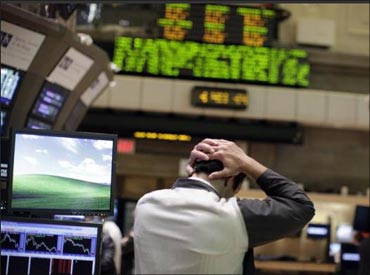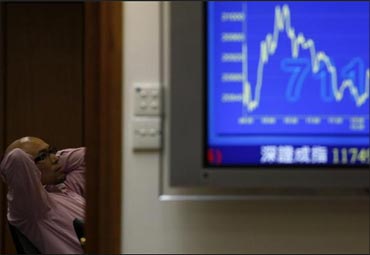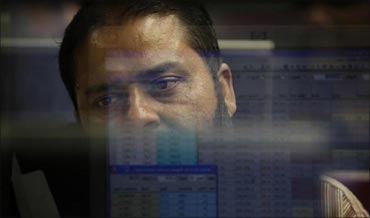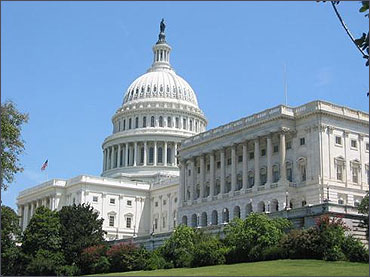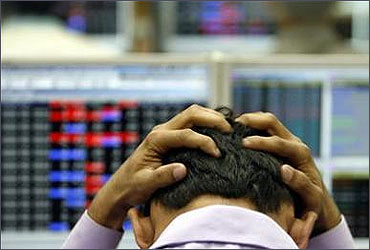 | « Back to article | Print this article |
MAYHEM: Sensex plunges, world markets crash!
Indian stocks plunged deep into the red this morning as the Sensex lost more than 500 points within minutes of the market opening on concerns over the US losing its top-notch credit rating due to mounting debts.
The 30-share benchmark index dropped within minutes of opening to 16,793.07 points, its lowest level since June, 2010, registering a fall of 512 points from its previous close.
However, the Indian markets stemmed some of the fall and at close the Sensex had trimmed its losses to close at 16,690, down 315 points. The Nifty closed at 5119, down 93 points.
Global stocks fell on Monday despite hectic efforts by policymakers to arrest the slide in investor confidence after S&P downgraded the US credit rating. This, despite a jump in euro on hopes that the European Central Bank will act to stop Europe's debt crisis from hitting Italy and Spain hard.
All Asian markets were trading in the deep red this morning, with huge losses seen in Hong Kong, South Korea and Japan. Hong Kong's Hang Seng Index was down 4.13 per cent, while Japan's Nikkei was trading 2.06 per cent lower on Monday morning.
RBI 'continuously assessing impact of US crisis'
Noting that India was not insulated from global developments like the downgrade of the United States, the Reserve Bank on Monday said it was closely monitoring the situation and would continuously assess the impact on the Indian economy and financial markets.
The RBI also said the entire policy and regulatory framework of the country must be "prepared to respond to turbulent financial market conditions arising out of external developments".
Click NEXT to read on . . .
MAYHEM: Sensex plunges, world markets crash!
South Korean shares opened 1.40 per cent lower in Seoul, even as the bourses there contemplated measures to counter any major plunge.
Japan stocks were also down over 1.3 per cent, while losses were also seen in a host of other Asian markets, including India.
The losses were much sharper at about 3 per cent in Hong Kong stocks.
The RBI said in a statement that "developments relating to the US economy last week have significantly increased uncertainty about its prevailing condition."
"The Reserve Bank is closely monitoring all key indicators and will continuously assess the impact of global developments on rupee and forex liquidity and macroeconomic stability. We will respond quickly and appropriately to the evolving situation," it added.
The US lost its top-notch 'AAA' rating this weakened and the development has further added to the worries of global markets, already grappling with the debt crisis in Europe.
"A sharp fall in US equity markets on Thursday was followed by a downgrade in the long-term US sovereign rating by rating agency Standard & Poor's from AAA to AA+ with a negative outlook on Friday," the RBI said.
"Two other rating agencies, Moody's and Fitch, had recently maintained their AAA rating, but suggested that this could change.
"The downgrade has raised concerns of continuing turmoil in global financial markets, as investors re-allocate portfolios in response to heightened risk perceptions stemming from both developments," the RBI said.
Click NEXT to read on . . .
MAYHEM: Sensex plunges, world markets crash!
Meanwhile, the futures market was also down sharply in the US, continuing the downtrend of the previous week that saw over $2.5 trillion worth of investors' money wiped out in markets across the world.
Experts were expecting some sort of recovery later in the day after the initial shock, given the steps announced by global policymakers.
The RBI further said that India was not insulated from such developments, as Friday's market behaviour demonstrated here.
"It may, however, be noted that in the worst phase of the recent global financial crisis, the economy grew by 6.8 per cent, suggesting high resilience emerging from domestic factors.
"While downside risks to growth may have increased in the wake of global developments, they are likely to have limited impact," the RBI said.
The RBI said its immediate priority was to ensure that adequate rupee and forex liquidity is maintained in domestic markets to prevent excessive volatility in interest rates and exchange rates.
"Rupee liquidity is being provided through the repo window of the Liquidity Adjustment Facility (LAF). As of now, the banking system does not face any liquidity pressures, as evident from the low level of dependence on liquidity injections under the LAF," it said.
Click NEXT to read on . . .
MAYHEM: Sensex plunges, world markets crash!
The central bank said that banking system has an adequate stock of Statutory Liquidity Ratio (SLR) securities, which are eligible for repo transactions.
"As regards forex liquidity, in anticipation of financial market turbulence related to the US debt ceiling impasse, the Reserve Bank made an assessment of the ability of the forex reserve portfolio to meet potential forex requirements in the event of significant capital outflows.
"This exercise indicated that there were sufficient liquid reserves to meet the demand for forex even in a stress scenario," it added.
The G-7 economies have pledged to "take all necessary measures to support financial stability and growth", while the European Central Bank said it would actively buy Eurozone bonds. Italy and Spain also announced new measures and reforms to bolster their economies.
The International Monetary Fund welcomed the statements made by the leaders of the G7 countries and European Central Bank on taking steps to ensure market stability.
Click NEXT to read on . . .
MAYHEM: Sensex plunges, world markets crash!
"The swift implementation of the commitments by the Euro Area Governments on July 21, 2011, and the recent agreement to reduce the United States' fiscal deficit in the medium term, without undermining growth, are further critical elements for financial stability," IMF chief Christine Lagarde said.
Ratings agency S&P this weekend downgraded the long-term sovereign rating of the US from the top 'AAA' level for the first time in history.
Click NEXT to read on . . .
MAYHEM: Sensex plunges, world markets crash!
Geithner to remain as Treasury Secretary
US Treasury Secretary Timothy Geithner will not resign, his spokesman said today, rejecting demands from Republicans for him to step down from his post after a recent US credit rating downgrade.
"Secretary Geithner has let the President know that he plans to stay on in his position at Treasury," said the Assistant Secretary for Public Affairs, Jenni LeCompte, in a statement.
Click NEXT to read on . . .
MAYHEM: Sensex plunges, world markets crash!
However, he did not say how long Geithner would stay as Treasury Secretary.
Earlier, according to media reports, Geithner had told the US President, Barack Obama, that he would leave his cabinet by this summer as his family has moved to New York. But the Treasury statement did not address this question.
Click NEXT to read on . . .
MAYHEM: Sensex plunges, world markets crash!
"He looks forward to the important work ahead on the challenges facing our great country," LeCompte said.
Republican Senator Rand Paul had asked Geithner to step down for what his office called a "gross mismanagement of federal economic policy and his role in the first-ever downgrade of United States debt."
Click NEXT to read on . . .
MAYHEM: Sensex plunges, world markets crash!
Standard & Poor's had two days ago docked the United States from a sterling AAA to a AA+ rating on Friday, largely because of the failure of bitterly divided US leaders to reach a consensus on containing the country's spiralling debt.
G7 vows to back stability
Financial chiefs and central bankers of the G7 nations on Monday vowed to 'take all necessary measures to support financial stability and growth' as nervous stock markets the world over re-opened extremely weak.
Click NEXT to read on . . .
MAYHEM: Sensex plunges, world markets crash!
"We are committed to taking coordinated action where needed, to ensuring liquidity, and to supporting financial market functioning, financial stability and economic growth," a statement said as Asian markets reopened lower after a tumultuous weekend.
IMF welcomes statement by EU, G7 on market stability
The International Monetary Fund has welcomed the statements made by the leaders of the G7 countries and European Central Bank on taking steps to ensure market stability.

